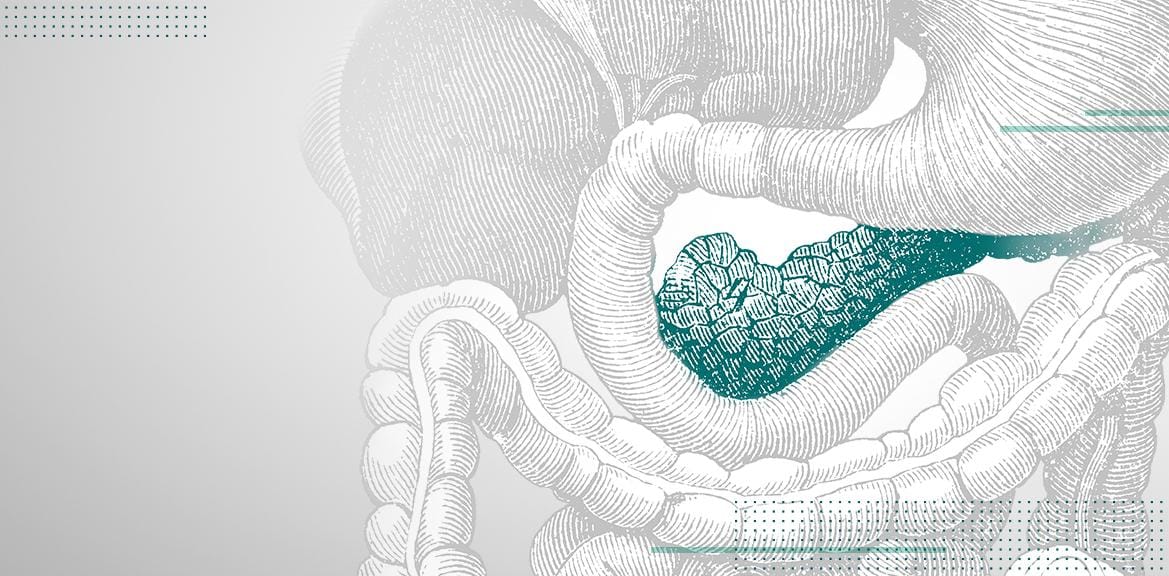
Pancreatic Elastase
What is pancreatic elastase
Pancreatic elastase is an enzyme produced by the exocrine tissue of the pancreas. It is released into the small intestine, together with other enzymes, in order to digest a variety of foods. One of its key characteristics is that it remains extremely stable and is not degraded during intestinal transit.²
It may be referred to in several ways: pancreatic elastase, faecal elastase, elastase-1, or ELA1.
In the digestive tract, elastase is not broken down, and thus it can be found in the faeces, where it accumulates at a concentration six times higher than that in duodenal juice.
This means that the presence of elastase in faeces reflects proper pancreatic function, while a reduced quantity may indicate pancreatic dysfunction and, consequently, low elastase levels.¹
Associated conditions
Pancreatic insufficiency is the inability of the pancreas to produce and/or transport digestive enzymes necessary for food digestion and intestinal absorption. This clinical condition typically results from progressive pancreatic damage, which may be due to acute or chronic pancreatitis, or it may be caused by autoimmune diseases such as chronic inflammatory bowel diseases (Crohn’s disease and ulcerative colitis) and certain connective tissue disorders like Sjögren’s syndrome and rheumatoid arthritis.
Pancreatic insufficiency usually presents with symptoms of malabsorption, malnutrition, vitamin deficiency, and weight loss (or failure to gain weight in children), and is often associated with steatorrhoea (loose, fatty, foul-smelling stools).
In cases of pancreatic insufficiency, levels of the enzyme elastase are reduced (below approximately 200 µg/g of faeces). In patients with cystic fibrosis who have severe pancreatic insufficiency and steatorrhoea, elastase-1 levels can be very close to zero.
A decrease in the levels of this enzyme in faeces is significant not only in chronic pancreatic disease but also in other conditions such as diabetes mellitus (type I and II), osteoporosis, inflammatory bowel disease (Crohn’s disease, ulcerative colitis), coeliac disease, cholelithiasis, AIDS, and chronic renal failure.³⁻⁴ In the presence of one or more of these clinical conditions, it is important to assess potential exocrine pancreatic insufficiency, as replacement therapy with pancreatic enzymes can improve the patient’s nutritional and metabolic status.
How to detect it
Measurement of elastase in faeces is currently considered the Gold standard for the non-invasive assessment of pancreatic function, boasting high sensitivity and specificity and low intra-individual variability. Elastase is produced exclusively by the pancreas and is not broken down during intestinal transit, thus reflecting proper pancreatic function.
The faecal elastase test is usually prescribed when a patient shows symptoms of pancreatic insufficiency—for instance, abdominal cramps, fatty stools, or signs of malabsorption or malnutrition such as weight loss or deficiency in fat-soluble vitamins (e.g. vitamins D or A).
References
- D. C. Whitcomb et al. AGA Clinical Practice Update on the Epidemiology, Evaluation, and Management of Exocrine Pancreatic Insufficiency: Expert Review. Gastroenterology 2023;165:1292–1301.
- A. Sziegoleit & D. Linder: Studies on the Sterol-Binding Capacity of Human Pancreatic Elastase 1; Gastroenterology; 1991
- Andriulli et al.: Exocrine Pancreatic Insufficiency, as Assessed by Fecal Elastase-1 Levels, in Diabetic Patients: An Estimate of Prevalence in Prospective Studies; Journal of Diabetes and Metabolism; 2014
- R. Vanga et al.: Diagnostic Performance of Measurement of Fecal Elastase-1 in Detection of Exocrine Pancreatic Insufficiency: Systematic Review and Meta-analysis; Clinical Gastroenterolology and Hepatolology; 2018
FAQ
-
- Values above 200 µg/g of stool indicate normal pancreatic function.
- Values between 100 and 200 µg/g of stool suggest mild pancreatic dysfunction.
- Values below 100 µg/g of stool indicate severe pancreatic dysfunction, potentially associated with pancreatic exocrine insufficiency (PEI).
-
The stool sample is collected using ready-to-use IVD medical devices from the EasyCal Family, specifically designed for the pre-analytical processing of stool samples.
Each EasyCal version is associated with a specific diagnostic kit and allows the extraction and preservation of the pancreatic elastase biomarker:- EasyCal® Turbo-Universal for the turbidimetric test Elaprest Turbo (ref. 9298)
- EasyCal® for the rapid test ElaFast (ref. 9191EP)
- Panel FE pre-analytical device for the ELISA test Panel FE (ref. 9048)
-
No, the same ready-to-use IVD device EasyCal Turbo-Universal (Ref. 9502) is used to extract all three faecal biomarkers: pancreatic elastase, calprotectin, and haemoglobin. EasyCal Turbo-Universal is also validated for self-sampling.
-
Yes, the stool sample can be collected at home using the ready-to-use IVD medical device EasyCal Turbo-Universal Self Collection (ref. 9502SC), which contains the extraction swab for pancreatic elastase.
-
No, enzyme replacement therapy does not affect elastase measurement.
-
Yes, stool samples of varying consistencies can be analysed. To facilitate proper classification of the stool sample, it is recommended to refer to the image showing the “Bristol Stool Scale”:

For self-sampling in reference to the “Bristol Stool Scale”, only stool samples falling under Types 2 to 6 should be used. It is advisable to avoid self-sampling for stool samples classified as Type 1 (very hard) and Type 7 (very liquid) on the Bristol Stool Scale.
-
Ready-to-use IVD devices allow simple, quick, and standardized sampling thanks to the grooves on the sampling stick combined with a filter, which ensures a fixed amount of sample is collected.
-
Stool samples must be stored as follows:
• For the turbidimetric test Elaprest Turbo (ref. 9298): up to 3 days at room temperature, and up to 14 days at 2–8°C (recommended storage temperature).
• For the rapid test ElaFast (ref. 9191EP): up to 2 days at 2–8°C. For longer storage, freeze the sample at -20°C. Frozen samples at -20°C are stable for up to 1 year and may undergo a maximum of 2 freeze-thaw cycles. The sample extracted with EasyCal® can be stored at 2–8°C (up to 3 days).
• For the ELISA test Panel FE (ref. 9048): at room temperature up to 40°C for up to 5 days; at 2–8°C for up to 1 week; if frozen at -18°C, for up to 1 year.For the correct procedure, please refer to the Instructions for Use provided with each diagnostic kit.

